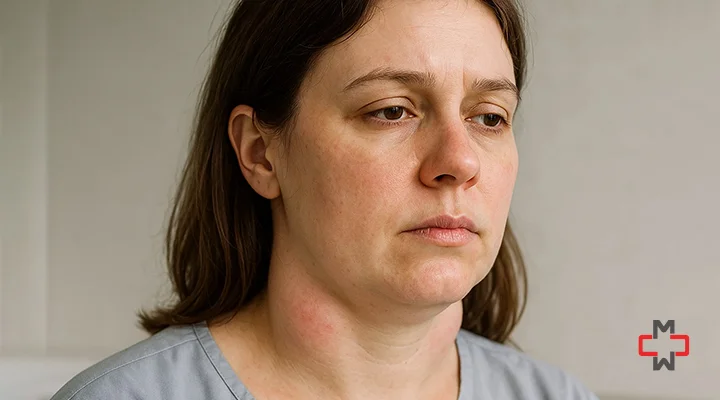Yes, allergies can sometimes lead to swollen lymph nodes, but it’s usually an indirect effect of your immune system reacting to allergens or fighting a secondary infection caused by inflammation.
If you’ve ever had a seasonal allergy flare-up and noticed a swollen gland under your neck or jaw, you’re not alone. It’s a common concern we hear often at Manhattan Medical Arts. But can allergies actually cause swollen lymph nodes — or is there something else going on?
🩺 Dr. Syra Hanif, our experienced Primary Care physician, frequently sees patients in Manhattan presenting with swollen glands during allergy season. Her evaluation often starts with a physical exam, followed by targeted blood work, allergy test and imaging if needed.
What Are Lymph Nodes and Why Do They Swell?
Lymph nodes are small, bean-shaped glands that play a vital role in your body’s immune defense. They’re part of the lymphatic system and help filter out bacteria, viruses, and allergens.
Swelling in lymph nodes — medically called lymphadenopathy — happens when the immune system activates to fight what it sees as a threat. This can include:
- Viral or bacterial infections
- Inflammatory reactions
- Allergens or irritants
How Do Allergies Trigger Swollen Lymph Nodes?
The connection lies in your immune response. When your body encounters an allergen (like pollen, pet dander, mold, or certain foods), it releases chemicals such as histamine. These can cause:
- Inflammation in nasal or sinus tissues
- Mucus buildup and congestion
- Increased susceptibility to sinus infections or upper respiratory infections
These infections — even mild ones — may result in swollen lymph nodes near the affected area, especially around your neck, jawline, or behind your ears.
Important: Allergies alone don’t often cause noticeable lymph node swelling unless inflammation or infection is present.
✅ Book a Walk-In or Online Appointment if you’ve noticed swollen lymph nodes during allergy season. We’ll help pinpoint the cause and ease your symptoms quickly.
Real-World Insight From Our Practice
At Manhattan Medical Arts, our medical team sees dozens of patients every month reporting persistent allergy symptoms that turn out to involve:
- Enlarged cervical lymph nodes
- Sinusitis triggered by allergic inflammation
- Food allergy flares mimicking viral infections
- Swelling due to postnasal drip and congestion
Dr. Syra Hanif emphasizes a comprehensive evaluation that looks beyond surface symptoms. “We assess the entire clinical picture — not just the lymph node, but the allergic triggers, immune response, and any infection risk,” she explains.
What Tests Are Used to Diagnose Allergy-Related Lymph Node Swelling?
Our diagnostic process includes:
- Physical Exam: Checking size, tenderness, mobility, and symmetry of lymph nodes.
- CBC (Complete Blood Count): To rule out infections or elevated white blood cells.
- IgE Antibody Testing: Measures allergen-specific immune activity.
- Imaging (Ultrasound/CT): In complex or persistent cases.
Results from these tests help us confirm whether lymph node swelling is allergic, infectious, or something more serious — and guide your treatment accordingly.
When to See a Doctor About Swollen Lymph Nodes
Schedule a visit if:
- Swollen lymph nodes last longer than two weeks
- The node feels hard, fixed, or painful
- You also have fever, weight loss, night sweats, or fatigue
- You’re unsure whether symptoms are due to allergies or an infection
A detailed evaluation from your Primary Care provider is the best way to get answers.
Allergies and Swollen Lymph Nodes
- Over 50 million Americans suffer from allergies each year (CDC, 2023).
- 10–15% of allergy patients report occasional gland swelling, especially during peak pollen season (NIH clinical summary).
- According to JAMA, allergy-induced inflammation increases risk of sinus infection by 2.4x, which often involves lymph node swelling.
Home Care Tips for Managing Allergy-Induced Lymph Node Swelling
While medical evaluation is key, here are ways to reduce discomfort at home:
- Warm compresses to reduce swelling and improve circulation
- Hydration to thin mucus and support lymphatic drainage
- Rest and sleep to strengthen your immune system
- OTC antihistamines (e.g., cetirizine or loratadine)
- Pain relievers (ibuprofen or acetaminophen) for tenderness
- Nasal irrigation using saline spray or neti pot
🖱️ Schedule a Virtual Consultation to discuss symptom management from home or get a quick diagnosis online.
FAQs
Can allergies cause swollen lymph nodes in the neck?
Yes — indirectly. Allergies can inflame the sinuses, leading to infections or tissue irritation that causes the lymph nodes in the neck to swell.
How long do allergy-related swollen lymph nodes last?
They typically resolve within 7–14 days if the underlying allergic reaction or infection is treated.
Should I be worried about a swollen lymph node?
Most are harmless. But if the swelling lasts more than 2–3 weeks, feels hard, or is accompanied by fever or weight loss, see a doctor immediately.
What tests confirm if allergies are the cause?
Common tests include IgE levels, CBC, and sometimes imaging (like ultrasound or CT scan).
Can Dr. Syra Hanif help me diagnose the cause?
Absolutely. Dr. Syra Hanif offers comprehensive primary care evaluations at Manhattan Medical Arts to determine the exact cause and rule out more serious issues.
Final Thoughts
Swollen lymph nodes during allergy season can be alarming — but they’re often your body’s way of telling you it’s reacting to something. Whether it’s pollen, pet dander, or a related infection, understanding the cause helps you manage symptoms better.
At Manhattan Medical Arts, we take the time to get it right — combining lab work, physical exams, and allergy screening to give you a clear answer.
✅ Book Your Appointment Now (Walk-In, Online, or Virtual)
Disclaimer
This blog is for informational & educational purposes only, and does not intend to substitute any professional medical advice or consultation. For any health related concerns, please consult with your physician, or call 911.
-
About The Author
Dr. Syra Hanif M.D.Board Certified Primary Care Physician
Dr. Syra Hanif is a board-certified Primary Care Physician (PCP) dedicated to providing compassionate, patient-centered healthcare.
Read More







